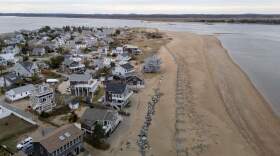-
Household waste increases by 25% between Thanksgiving and New Years. Rules vary by municipality on what you can recycle and what needs to go into the trash.
-
Fast-fashion brands have only upped the production with ultra-fast fashion garments, made in as little as a week, full of plastics and short-lasting, now accounting for up to a third of the entire industry.
-
President Trump made a similar proposal in his first term, but after facing political pushback, reversed himself and expanded a drilling ban.
-
Washington Gov. Bob Ferguson calls this one of the most devastating natural disasters in the state's history.
-
This year's Arctic Report Card from the National Oceanic and Atmospheric Administration finds that the northernmost part of the Earth is warming faster than the global average, leading to melting glaciers, shifting fish populations, and rivers running orange.
-
After the hurricane in Jamaica, the government had a pot of money to help rebuild, called the Catastrophe Bonds payout.
-
An animal not seen in Ohio in over a century, the fisher, has been spotted on a local wildlife camera. The sighting has raised hopes that the native mammal is naturally returning to the state.
-
The grants, which were previously canceled by FEMA, support more than 60 infrastructure projects across the state.
-
With the rise of artificial intelligence, the United States is trying to satisfy an unquenchable thirst for new sources of electricity.
-
Forecasters predicted an above-average season this year.
-
Most hunters headed into the field will be armed with bullets made of lead. But lead is toxic for predators eating the animals that hunters shoot and leave behind.
-
The move comes after commissioners signaled support for the natural gas pipeline project last year.







